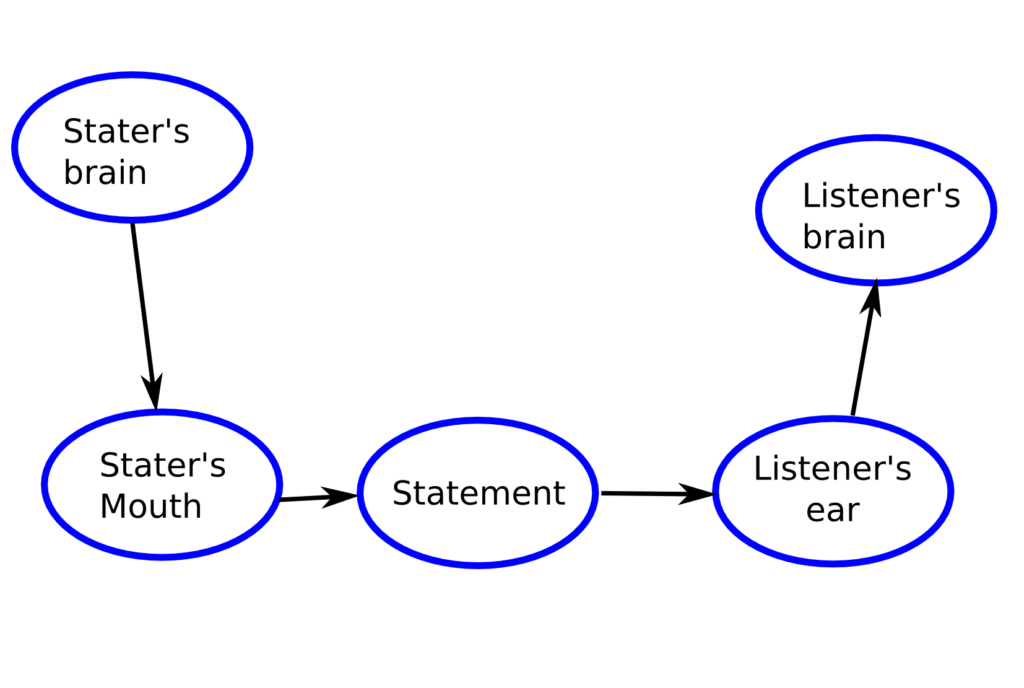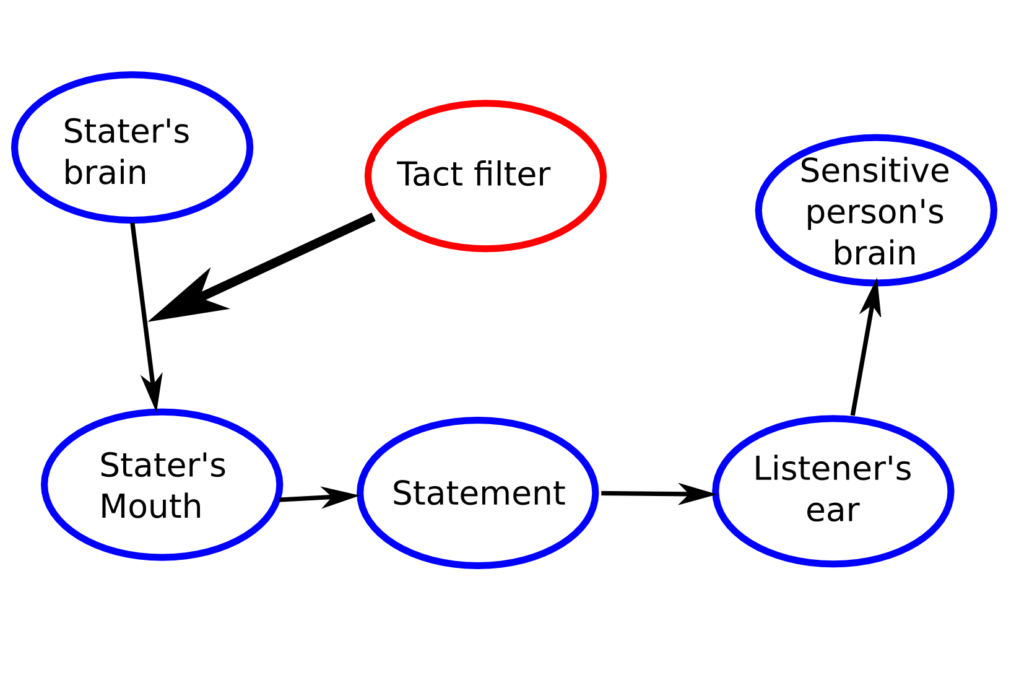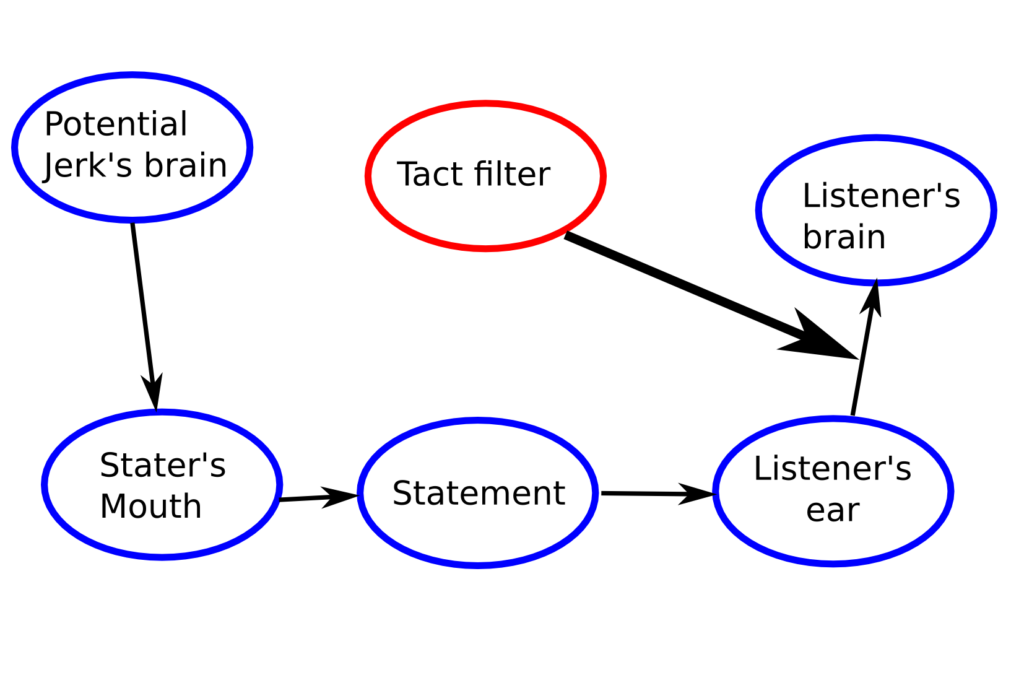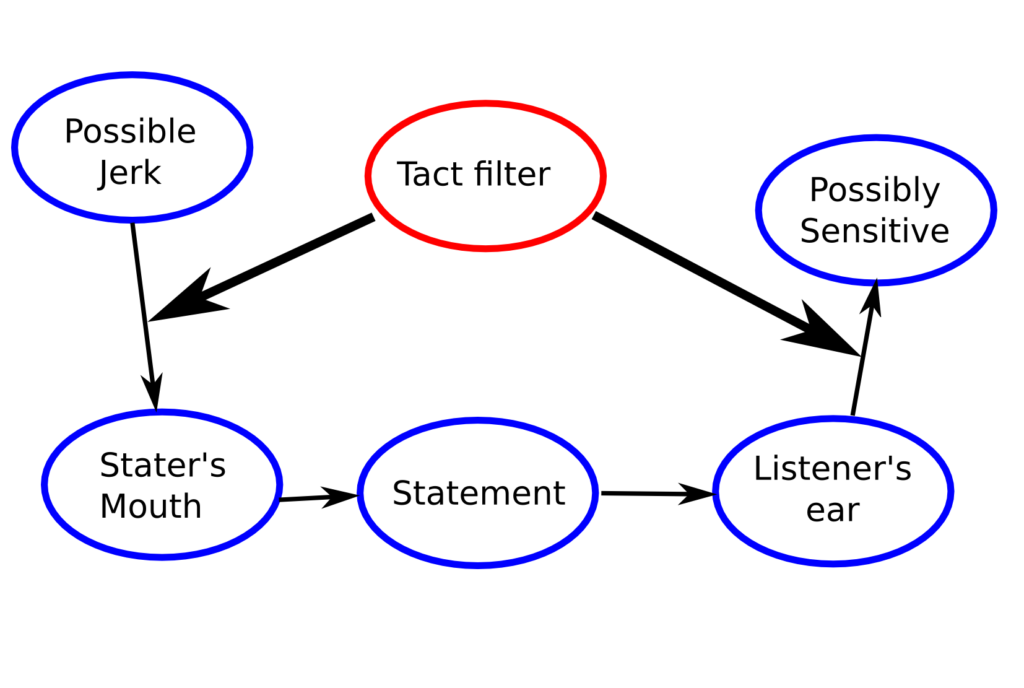Filter on the way in, Filter on the way out...
post by Elo · 2016-08-12T07:24:49.201Z · LW · GW · Legacy · 22 commentsContents
Moving parts to this system Who is responsible? The wild Q: But it's not my responsibility because I live in (Launch | Listener) responsibility land. Compounding factors None 22 comments
Original post: http://bearlamp.com.au/filter-on-the-way-in-filter-on-the-way-out/
I'd like to quote tact filters by Jeff Bigler:
All people have a "tact filter", which applies tact in one direction to everything that passes through it. Most "normal people" have the tact filter positioned to apply tact in the outgoing direction. Thus whatever normal people say gets the appropriate amount of tact applied to it before they say it. This is because when they were growing up, their parents continually drilled into their heads statements like, "If you can't say something nice, don't say anything at all!"
"Nerds," on the other hand, have their tact filter positioned to apply tact in the incoming direction. Thus, whatever anyone says to them gets the appropriate amount of tact added when they hear it. This is because when nerds were growing up, they continually got picked on, and their parents continually drilled into their heads statements like, "They're just saying those mean things because they're jealous. They don't really mean it."
When normal people talk to each other, both people usually apply the appropriate amount of tact to everything they say, and no one's feelings get hurt. When nerds talk to each other, both people usually apply the appropriate amount of tact to everything they hear, and no one's feelings get hurt. However, when normal people talk to nerds, the nerds often get frustrated because the normal people seem to be dodging the real issues and not saying what they really mean. Worse yet, when nerds talk to normal people, the normal people's feelings often get hurt because the nerds don't apply tact, assuming the normal person will take their blunt statements and apply whatever tact is necessary.
So, nerds need to understand that normal people have to apply tact to everything they say; they become really uncomfortable if they can't do this. Normal people need to understand that despite the fact that nerds are usually tactless, things they say are almost never meant personally and shouldn't be taken that way. Both types of people need to be extra patient when dealing with someone whose tact filter is backwards relative to their own.
Later edit for clarification: I don't like the Nerd|Normal dichotomy because those words have various histories and baggage associated with them, so I renamed them (Stater, listener, Launch filter, Landing filter). "Normal" is pretty unhelpful when trying to convey a clear decision about what's good or bad.
Okay; so Tact filters. But what should we really do? What's better? Jeff's Nerd or Normal? And more importantly - In future ambiguous cases - what should we do?
Moving parts to this system
There are a few moving parts to tact, I am going to lay them out:
- Stater - the person stating something
- Statement - the thing being said
- Listener - the person hearing it, or the person who it is intended to be directed to.
- Tact filter - the filter that turns the Statement into a clean one.
- Launch responsibility - the Stater's responsibility to launch the statement in certain ways. (Jeff's normal)
- Landing responsibility - The listener's responsibility to receive the statement in certain ways. (Jeff's nerd)
In a chart it looks like this:
Who is responsible?
In Landing responsible culture, you are responsible for the incoming tact.
But this isn't great because it labels anyone you are talking to as "potential jerks".
In Launch responsible culture:
The responsibility to be tactful prepares the statement for a sensitive person. Which isn't great either. Tact takes time, takes energy and effort, what if no one ever needed to be tactful? Everything would also be fast.
The wild
So this is real life now. You don't really know if the other person is tactful or sensitive or a jerk or just normal... The best possible plan for unknowns:
It's not rocket science. Said again:
- actively be less offensive when you say things that might be taken offensively
- actively be less offended when you hear things that sound offensive
Q: But it's not my responsibility because I live in (Launch | Listener) responsibility land.
A: yes it is! No you don't! You live on earth. In the real world, where you sometimes encounter people living in the other land. Which is a fact. You can choose to piss them off when you meet them but you should know that's a choice and up to you. And now that you know this; the responsibility is on you to make the better choice.
Compounding factors
Even this model leaves out all the further compounding factors.
- What if the Stater thinks a statement is tactful but that same statement is taken as non-tactful by the listener?
- What if the stater is used to their statements being taken as tactful on every day except today?
- What if the particular pair of stater-listener has an existing negative relationship?
I don't know. Err on the side of caution.
Questions:
- What other communication habits have a filter? Does it pay to err on the side of caution?
- Aside from the fallacy of the middle, can this become a rule?
Another solution: https://en.wikipedia.org/wiki/E-Prime
Meta: this post was inspired by Sam's post on a similar topic.
Meta: this took 2 hours to think about, write and draw out what I meant.
22 comments
Comments sorted by top scores.
comment by SquirrelInHell · 2016-08-12T08:11:41.976Z · LW(p) · GW(p)
I like that you analysed this topic, however after thinking about it I came to conclusions that are not compatible with your approach.
I do not believe you are suggesting any policy in practice that is substantially different from what I'd suggest.
However I want to oppose the "filter" approach, and suggest it is more growth-y to look at this differently.
The idea of using a "filter" on your communication sounds to me like it suggests "dressing up" or softening your statements, which blocks people from transferring their thoughts to other people. Which makes all the people involved lose.
Instead, I suggest to keep conversations healthy to such a degree, that you can say whatever it is you wanted to express. And also to preempt any misunderstanding by saying what you DON'T mean if the topic is sensitive.
But basically I strongly oppose the approach that assumes filtering communication.
It makes more sense to work on preparing ground to enable communication to happen more efficiently and without undue emotion/offense.
Replies from: Gunnar_Zarncke↑ comment by Gunnar_Zarncke · 2016-08-12T21:16:02.444Z · LW(p) · GW(p)
I agree. And I want to add that there is a cost trade-off involved: The growthy approach takes even more energy (until you master it) than the dual filter approach - which takes more than the one filter only approach.
comment by Decius · 2017-05-30T23:41:08.616Z · LW(p) · GW(p)
The listener's filter needs as an input the nature of the speaker's filter, or information is irretrievably lost.
The speaker's filter needs as an input the nature of the listener's filter, or information is irretrievably lost.
Having two codependent filters like that has a lot of stable non-lossy outcomes. One easy one to describe is the one where both filters are empty.
Unless you can convince me of a specific pair of filters such that many more people that I want to talk to use those two filters than use empty filters (increasing the number of people with whom I can communicate losslessly) or that provide some benefit superior to empty filters, I'll continue to use empty filters as much as possible, even if I have to aggressively enforce that choice on others.
Signalling higher status by applying 'tact' when I don't want to be insulting is not a benefit to me. Giving others more deference than myself regarding what filters to apply is not a benefit to me. If I want to insult someone, I can do that as effectively by insulting them as a tact culture communicator could by speaking without tact.
comment by ChristianKl · 2016-08-12T09:18:44.189Z · LW(p) · GW(p)
Many nerds do get hurt, they just numb themselves to the pain. Often nerds don't enjoy normal social interaction because it's hurtful to them. They don't relax in it. That's why nerds are often introverts and not extroverts.
actively be less offended when you hear things that sound offensive
I do know people who have the emotional control to decide to be less offended but I think most nerds don't have the ability to decide whether or not to feel offended. They will rather interpret the suggestion as a prompt to ignore the pain and numb themselves.
Replies from: Gunnar_Zarncke↑ comment by Gunnar_Zarncke · 2016-08-12T21:51:28.526Z · LW(p) · GW(p)
Many nerds do get hurt, they just numb themselves to the pain.
Probably.
Often nerds don't enjoy normal social interaction because it's hurtful to them. They don't relax in it.
Maybe some. But that doesn't sound right in general.
That's why nerds are often introverts and not extroverts.
That seems unlikely. If seems likely that it is rather the other way around. Introverts become nerds.
1) Personality types are well-known to be generally very stable (at least the big Five). With the exception of... extroversion with a small tendency from introversion toward extroversion over time.
2) Personality type is largely heritable.
I think most nerds don't have the ability to decide whether or not to feel offended.
If nerds have a typical mental development then a sizable fraction of them should be able to handle it. ( https://en.wikipedia.org/wiki/Constructive_developmental_framework#Stages_of_adult_development ) And if you think nerds are less developed then non-nerds then I'd like to hear a reason for that.
Replies from: ChristianKl↑ comment by ChristianKl · 2016-08-13T10:08:29.211Z · LW(p) · GW(p)
Earlier this year I had the experience of asking someone to get together to study anatomy after a workshop. He rejected me and it felt uncomfortable in a way I wasn't used to. Partly because the emotional barriers I was living with the last decades weren't there anymore.
I was used that my emotional reaction to rejection was tensing up and that tensing up sometimes being painful. I got to a stage where I usually didn't tense up painful anymore after reactions. Then at that day I didn't tense up but that allowed a deeper emotion to flow through my body.
It took me quite a while to make sense of the situation and fortunately I have someone who could explain to me what was happening to me.
If nerds have a typical mental development then a sizable fraction of them should be able to handle it.
Are you saying that you have the choice to feel offended at what I'm saying in a way where you can tell me where in your body you feel the emotion? Where your pulse changes in the way the pulse changes when someone get's offended.
I don't think that ability comes with any of the standard stages of cognitive development. A few Grinberg practioners seem to have it at a primary level and can switch emotions on/off directly but most people can't do that.
The 10,000 hours of meditation crowd can go into a state of mindfulness which often happens to have the effect of being less offended/processing the emotion, but from what I know that usually doesn't come with an ability to directly switch an emotion like that on or off.
You might have the ability to change your interpretation actively to search for a different interpretation. You might do some CBT move to not have thought that cause offend you, but very few people have an ability to do this indirectly.
2) Personality type is largely heritable.
That an illustration of the fact that most people don't have a choice over basic elements such as what emotion they want to feel on a primary level.
It was also interesting that at LWCW a bunch of nerds reported that they enjoyed the social interaction in a way that they aren't used to enjoying social interaction. People who usually felt drained by social interaction didn't feel drained in that enviroment. Whether or not social interaction gives you energy or drains you is one of the classic characterisations of the introvert/extrovert axis.
Replies from: Gunnar_Zarncke↑ comment by Gunnar_Zarncke · 2016-08-13T16:22:31.192Z · LW(p) · GW(p)
I don't think that ability comes with any of the standard stages of cognitive development.
I agree that that ability is rare. And is is rare in general. So how is it relevant?
Whether or not social interaction gives you energy or drains you is one of the classic characterisations of the introvert/extrovert axis.
Me too. I'm in on the different effects of in/extroversion. I was mainly disputing the cause/effect. I guess you become a nerd because you are introvert not the other way around (most time).
Replies from: ChristianKl↑ comment by ChristianKl · 2016-08-13T19:27:14.854Z · LW(p) · GW(p)
I agree that that ability is rare. And is is rare in general. So how is it relevant?
The point is that most people that you tell "actively be less offended when you hear things that sound offensive" will likely put up emotional walls to reduce the feeling of offense instead of simply not being offended if they actively try to follow the prompt.
From CBT there's the acceptance paradox. There's a good likelihood that the person at whom you address the prompt won't accept that he feels offended afterwards. They won't accept the offence and suppress it.
The fact that the social interaction produced a bunch of supressed emotions makes them feel drained afterwards.
Elo's idea that the nerd way of doing social interaction is so great that it's worth telling other people to adopt it, is flawed. It's not flawed in an obvious way whereby Elo makes obvious reasoning errors but where there are effects that matter like the acceptance paradox that aren't in his mind when he thinks through the issue.
The solution isn't to add a filter that blocks some emotions of feeling offended. It's a solution that seems "not rocket science". Compared to that Grinberg, Radical Honesty, Nonviolent Communication or a host of other frameworks that give approaches to dealing with the situation are more complex and more like rocket science.
I remember a month ago a discussion about King, Warrior, Magician, Lover (MWKL) where Elo's approach was to look for conclusions of the book that are simply enough to list them in a bulletpoint list and judge KWML by it. Recently he wrote a post about taking advice that also looking at simple one sentence maxims and an effective way to dealing with them.
The MWKL approach in this situation would be to be conscious of what archtype you are playing out when you get offended and maybe think about what archtype you would want to play out. That's again a bit rocket science. Conceptually it's complex to adopt the habit of thinking in those archtypes and developing the conscious of sometimes being in an archtype that you don't want to be in.
To get back to the topic, I want to communicate with people around me with more authenticity and not with more filters. Putting down filters is hard but it's more what I want to live.
I guess you become a nerd because you are introvert not the other way around (most time).
Nerd is a word that's not very precise. I care more for the actual heuritics than the label.
Replies from: Gunnar_Zarncke↑ comment by Gunnar_Zarncke · 2016-08-13T22:14:11.518Z · LW(p) · GW(p)
Thank you for this very helpful explanation.
While I think that your critique is valid (I think your comment shows a deep understanding of the topic) I think it could be a bit more cheritable. On the other hand Elo might want to add one of these fashionable "epistemic status" headers that make clear the level of detail. I think the basic idea (filters) is explained well and useful. At least if you do not have thought much about in/extroversion or nerd culture.
For me the idea that I might hurt people with honest communication is quite recent. I mean I understand that people are different. Some consequences of my behavioral patterns were just not clear for me. And I didn't get helpful feedback about that - at least non that I was able to parse blind as I was. I think a cheritable reading would have been that Elo pointed out the beginning of the ideas - not their end. For that your commentary seems much more suitable.
Minor:
Elo's idea that the nerd for of how to do social interaction is so great that it's worth telling other people to adopt it, is flawed.
I have difficulty parsing thi, esp. around the highlighted part. I get that Elo's suggestion is meant somehow. Maybe you can clean that up.
Replies from: ChristianKl
